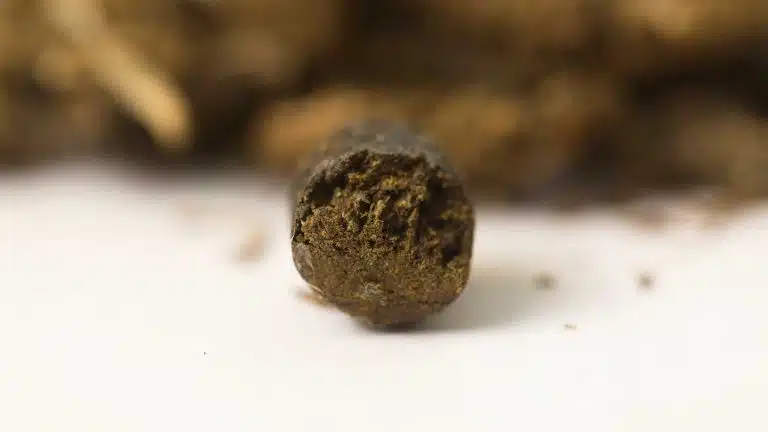What Is Hash? | Hashish Vs. Marijuana
- Hashish Vs. Marijuana
- How Is Hash Consumed?
- Short-Term Effects Of Hashish
- Long-Term Effects Of Hashish

In recent years, many people have started using a drug called hashish, or hash. Like marijuana, hash comes from the cannabis plant. However, hash differs from marijuana in some important ways, including THC content and product form.
Hashish Vs. Marijuana
The term “marijuana” refers to a mix of dried plant material (such as leaves, flowers, and stems) from the cannabis plant.
Hashish is a concentrated form of marijuana.
Concentrated Form
It consists of compressed trichomes, which are the most potent materials from the cannabis plant. The drug is usually solid and reddish-brown to black. It can also be made into a sticky goo called hash oil.
THC Content
Both marijuana and hash have the same active ingredient: delta-9-tetrahydrocannabinol (THC). This psychoactive chemical binds to receptors in your brain and makes you feel “high.”
Since hash is concentrated, it contains a much higher THC content than marijuana.
According to the Drug Enforcement Administration (DEA), hash and other marijuana concentrates typically have THC levels between 40% and 80%, while marijuana has about 20% THC. That’s why hash usually has much stronger effects.
How Is Hash Consumed?
Like marijuana, hash is often smoked in a pipe, water pipe (“bong”), cigar (“blunt”), or cigarette (“joint”). It can also be added to foods or brewed in tea. In addition, some people inhale hash oil through a vaporizer or other heating tool. This practice is called “vaping” or “dabbing.”
Short-Term Effects Of Hashish
Short-term effects of hash may include:
- relaxation
- euphoria (intense joy)
- anxiety
- increased appetite
- altered senses, such as seeing brighter colors or feeling time pass more slowly
- trouble thinking, problem-solving, or remembering
- impaired coordination
- increased heart rate
- increased blood pressure
- psychosis (a temporary loss of connection with reality that may include hallucinations, delusions, and paranoia)
You may also experience other effects if the hash contains adulterants. Hash dealers use adulterants to increase the drug’s weight so they can charge more for it. Some adulterants pose serious health risks when ingested. These substances include:
- glues
- dyes
- carcinogenic solvents like benzene and toluene
- barbiturates (powerful sedative drugs that can cause memory problems, trouble breathing, and addiction)
- ketamine (a dissociative anesthetic drug that can cause hallucinations, trouble breathing, and loss of consciousness)
Other adulterants, such as milk powder, may seem harmless. However, they lower the drug’s potency. As a result, a person may use larger amounts of hash than they normally would, increasing their risk of unpleasant effects and overdose.
Long-Term Effects Of Hashish
Long-term effects of hash may include:
Frequent Nausea
Regular hash use can lead to cannabinoid hyperemesis syndrome. This condition causes frequent bouts of nausea, vomiting, and dehydration.
Impaired Brain Function
People who use hash may experience problems with thinking, memory, and learning. That’s because THC can hinder brain function. Since hash has such a high concentration of THC, it’s more likely to cause this issue than regular marijuana.
Mental Health Problems
Some studies have linked hash and other forms of marijuana to depression, anxiety, and suicidal thoughts among adolescents.
Also, hash may worsen symptoms of schizophrenia, such as hallucinations and delusions, in people who already have the disease.
Lung Problems
Smoking hash increases your risk of chronic bronchitis, large airway inflammation, increased airway resistance, and lung hyperinflation. In addition, since THC can suppress your immune system, hash may make you more vulnerable to lung infections like pneumonia.
Heart Attack
Because hash raises your heart rate, long-term use can increase your risk of heart attack, especially if you already have heart problems.
Problems With Child Development
If you use hash while pregnant, the drug could hinder your baby’s brain development. Later in life, your child may experience issues with memory, attention, and problem-solving.
Overdose
A hash overdose occurs when you use so much hash that you experience serious side effects, such as:
- panic attacks
- extreme confusion
- paranoia
- hallucinations
- trouble walking
- trouble breathing
- irregular heartbeat
Most hash overdoses are not fatal. Still, if you or someone you know experiences the above symptoms, you should seek medical help right away.
Addiction
According to the National Institute on Drug Abuse, between 9 and 30 percent of people who use marijuana develop some level of addiction (also called substance use disorder). Due to its high THC content, hash generally poses a higher risk of addiction than regular marijuana.
Hash addiction can make you feel unable to stop using the drug despite negative consequences. It can also cause physical dependence. That means that if you do stop using hash, you’ll experience withdrawal symptoms such as:
- irritability
- anxiety
- loss of appetite
- trouble sleeping
- intense cravings for hash
Other signs of hash addiction include mood swings, isolation, and loss of interest in activities once enjoyed. Most people with this disease need professional treatment.
If you or a loved one struggles with hashish use, please reach out to an Ark Behavioral Health specialist. We offer a variety of substance abuse and addiction treatment options, including medical detox, mental health counseling, and support groups.
Written by Ark Behavioral Health Editorial Team
©2024 Ark National Holdings, LLC. | All Rights Reserved.
This page does not provide medical advice.
Drug Enforcement Administration - What You Should Know About Marijuana Concentrates
National Institute on Drug Abuse - Marijuana DrugFacts
National Institute on Drug Abuse - What are marijuana's effects on lung health?

Questions About Treatment?
Ark Behavioral Health offers 100% confidential substance abuse assessment and treatment placement tailored to your individual needs. Achieve long-term recovery.
100% confidential. We respect your privacy.
Prefer Texting?
Our friendly support team is here to chat 24/7. Opt out any time.







 Learn More
Learn More








